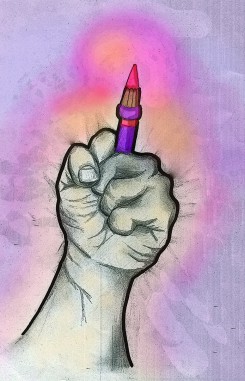The Charlie Hebdo attacks took the lives of 12 people and shook both France and the rest of the world. Raw footage taken by frightened Parisians — bearing the gritty image quality and shaky handling one would come to expect from the filming of such violence — have made these acts viewable by virtually anyone, and have sparked global outrage.
They have also sparked a conversation — one that asks not only how such events could occur, but what ought to be done in their wake.
That we cannot, and will not, tolerate this sort of violence as a society is already clear. However, the next question we have to ask ourselves is more difficult to reach a consensus on: can we, will we, tolerate the movies, articles, and cartoons that prompted the attack?
I think that we should — not just as a testament to those who were killed in Paris, which alone isn’t a good enough reason, and not for the sake of spiting our enemies, either. We ought to accept satire — more than that, embrace it — because doing so makes us better off as a society. Like a Shakespearean fool, the role of satire extends far beyond momentary comedic relief; it allows us to express our feelings in a way that — physically, at least — harms no one, and gives us a medium through which we can painlessly expose our own hypocrisy, and maybe even laugh about it. It’s funny, it’s poignant, it’s effective — it’s satire, and it does much more for society than we often give it credit for.
The most positive reason we need satire is because it reaffirms our position as a free society. That’s right; the very existence of publications like Charlie Hebdo and The Onion means we live in a culture free enough that we can make fun of the people in power (Stephen Harper, the IRS, the Illuminati) without having to worry about being physically threatened. That’s deserving of a major pat on the back. Freedom of speech is a luxury enjoyed exclusively by the free; the presence of satirical works that push the limits of what we ought to say and think means that our governments trust us, at least enough to publish a cartoon or two that pokes fun at them or their policies.
Often, the funniest satire isn’t political, but based on the everyday happenings of our fellow citizens. While these cartoons and articles may be dismissed as shallow and overly provocative, they serve a vital purpose in making us laugh at our own ridiculousness. Articles like “The 12 Whitest Things Overheard at Whole Foods” are there to make us realize that we are really not above the things that we make fun of. In fact, we’re all full of material that warrants satire. Not only is this amusing, but it’s also a way of checking and balancing our collective ego.
I agree that satire can’t and won’t save the world. But there’s an equally valid point as to why people — particularly students and members of higher-learning institutions — ought to pay particular attention to these attacks. There’s no mistaking the fact that the attacks were not on individuals, but on the principle of free speech. If students and faculty alike allow terrorists to silence the voices of satirists, who’s to say their own voices won’t be silenced at school? This could become a harsh reality should we choose not to take a collective stand. If we take away or limit satire, we limit the chance for analysis, critique, and revision: all basic components of academia. In short, we put our fears in the way of progress.
Beyond this, we need to see that the fallout of these attacks is going to affect us — be it through limitations of free speech, changes in policy, or just a general mindset of fear. As young people who are becoming politically conscious and are looking for ways to leave our marks on the world, cowardly shifts like these could greatly affect the way we might want to live our lives in the future. We can’t nip our own potential in the bud for fear of offending someone else.
One of the greatest lessons I’ve learned thus far in my life is this: you can’t please everyone. Someone will always be offended, no matter what you say. If expression isn’t a joke to those who will persecute us for it, it shouldn’t be one to us either.
Ivana Vujeva is a first-year student at Victoria College studying peace, conflict and justice studies, English, and art history.


